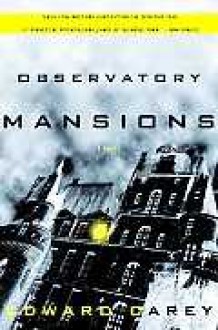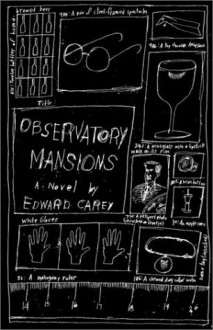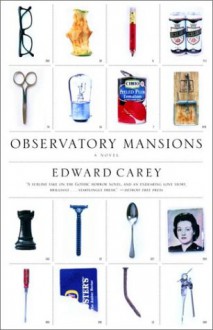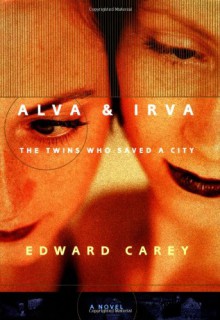
I was going to try to do a bang-up job on this review, because Edward Carey is a completely unique and, I think, brilliant author and more people should read him. I even got myself signed up as a gr librarian just so I could enter his author profile and then 'fan' him. But there's not very much to be found on him out there, and although his agent's website claims he's written a third novel (called
Little), I'm not sure it's ever been published. It would seem this guy is out of print. So even if you were inspired to read him, you probably couldn't get a copy of this, his second book, anyway. My own copy was purchased second-hand and comes from the Osceola County Library System, Central Branch. Which is weirdly fitting in some random and surreal way.
According to my gr friend list, only three of you out there have read any Edward Carey - and that, Observatory Mansions - his first.
Of the three, one of you read it only because I foisted it into your hands and begged you to give it a try. The other two are
karen and
greg, and they both rated it a 5. So this review is for them, and them alone. The rest of you - move along, there's nothing to see here.
So, karen and greg: imho,
Alva and Irva is even better than
Observatory Mansions. It has all the same gothic fairy-tale/allegorical/symbolic/surreal stuff going on and even some of the same themes (loneliness and isolation; marginalized and socially-stunted characters; obsessions and compulsions galore), but it seems to hold together as a story better. The lead characters, twin sisters (one of whom - Alva - narrates), are the Romulus and Remus of a fictional, Germanic city called Entralla. They are sweetly rendered, and if you are like me, you will identify with both of them - although they are opposites - and find them sad and lovely at the same time.
The book is nested within a conceit that it - the novel - is a guidebook to Entralla for the reader who might visit one day. It comes complete with restaurant recommendations and sight-seeing suggestions, and helpful reminders to the reader/tourist to display prominently a copy of the novel to obtain a ten per cent discount from participating establishments. There are just enough of these fourth-wall-busting interludes to keep things interesting and a little off-centre; not too many to bog down the main narrative flow in gimmickry. And because Carey is toying with the construction of reality as an over-arching theme, it works really well.
On the surface of it, this is a novel about "place" - home, I suppose you could say - how it shapes character and how characters - here, literally (in plasticene), shape it. Place is also psychology: the approach/avoidance conflict with Entralla embodied in the twins is also a separation/individuation conflict. The story is as much a coming-of-age one as anything else - but a twisted, dark and symbolic one.
Alva, the extroverted twin with wanderlust and a strong desire for friendship and adventure, wants nothing more than to leave Entralla to experience the world; and Irva, the introverted, agoraphobic one, is content with her sister as her only company and her painstakingly-rendered miniaturized version of Entralla as her world.
These two might as well be conjoined, they are so enmeshed: physically indistinguishable until Alva's frustration and pent-up desire lead her to make a permanent distinction (it's a delicious and ironic twist, and I'll not spoil it - caution if you read any of the other reviews here); psychologically, to separate will mean the end of one or both of them.
So that's all - or at least some - of the high-falutin' intellectual plot and thematic stuff going on. But at the same time, there is this
voice--this incredible Edward Carey voice that is whimsical, strange, idiosyncratic, creepy, quirky, dark but delicate, strangely "old fashioned" yet also contemporary, really indefinable in terms of time/place. The few reviews and jacket blurbs struggle to describe it as I am. Other reviews here on goodreads seem to have hit the mark a bit better. I especially liked
"the love child of Edward Gorey and Franz Kafka." Observatory Mansions has been referred to as: "
Amelie meets [b:We Have Always Lived In a Castle]" and "
Edward Scissorhands, but without the blame."
But really, the only way to 'get' Edward Carey is to read Edward Carey.
And that, as I started out by saying, is not an easy task.* Such a shame.
ETA: *my Osceola Public Library, Central Branch copy, just slightly more used than it arrived, is available to the next home that would welcome it. First come, first served -- PM me your address, please.
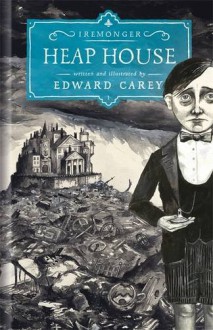

 Log in with Facebook
Log in with Facebook 

